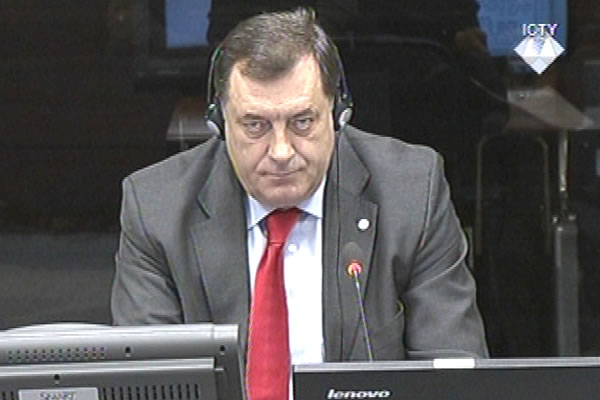Home
DODIK: SDS PARTY LEADERSHIP INVOLVED IN WAR CRIMES
Republika Srpska president Milorad Dodik claims he didn’t know that the Bosnian Serb leadership had planned and implemented the ethnic cleansing of non-Serbs, as he continues his evidence in Ratko Mladic’s defense. This prompted the prosecutor to confront Dodik with the fact that the expulsions of Muslims and Croats had been discussed at the Assembly at the time when Dodik was a deputy in the Assembly. In an interview in 2001 Dodik blamed the Serbian Democratic Party leadership for the crimes. Confronted with his own words, Dodik replied that it ‘seemed to me that some people from the SDS party leadership were involved in the crimes’
 Milorad Dodik, defence witness at Rako Mladic trial
Milorad Dodik, defence witness at Rako Mladic trial Prosecutor Alan Tieger continued the cross-examination of the current Republika Srpska president Milorad Dodik. Dodik has been called by Ratko Mladic’s defense. Today the prosecutor addressed Dodik’s claim that during the war the Bosnian Serb leadership did not implement a policy of ethnic cleansing. He was not aware of any plan, written or otherwise, to expel non-Serbs from the territory under the control of Mladic’s army. This prompted the prosecutor to show a series of documents which contradict Dodik’s claim.
In an interview in the Srpsko Oslobođenje newspaper in January 1995 Radovan Karadzic said that his leadership had a ‘list of actions and moves’. They were just waiting for 'the Muslims to make a mistake' before implementing them. At an Assembly session during the war Karadzic said that the plans had been ‘brainstormed’ before the conflict. Dodik dismissed the claims made by the previous Republika Srpska president, saying that they were just ‘a show for the public’ and evidence of Karadzic's 'vain gloriousness'. The prosecutor pressed on, noting that even in pre-war intercepted conversations that were not for public consumption, Karadzic said that his leadership ‘has a plan for everything’ and 'has prepared all the moves in advance'.
The prosecution alleges that numerous speeches in the Bosnian Serb Assembly clearly show what exactly that plan was. During the war Dodik was an independent member of the Assembly. As early as at the 16th Assembly session, held on 12 May 1992, Karadzic presented a document called the Six strategic goals. The document was later published in the Official Gazette. Republika Srpska was declared at that session and Mladic was appointed the supreme military commander. The first goal defined in the document was the territorial separation of Serbs from the other two ethnicities in BH. The other five goals defined the borders of a Serb republic on the rivers Una and Neretva, and the elimination of the border along the Drina river, access to the Adriatic Sea and the annexation of a part of Sarajevo.
Dodik argued that the creation of Republika Srpska was a legitimate endeavor. The prosecutor contradicted Dodik, stressing that the way in which the state had been established was illegal because it required the expulsion of non-Serbs. At an Assembly session in late November 1992 a member complained that all Muslims and Croats ‘who had been expelled’ could still claim Republika Srpska citizenship because they had been born there. In late August 1993, another member stated at an Assembly session it was noted that for Serbs there ‘can be no state in the Bosnian pot’ without ‘a gradual relocation and transfer’ of non-Serbs. In his speech before the Assembly members in January 1994 Karadzic said that before the war Muslims had had a relative majority in Doboj, while it was a ‘100% Serb town now’.
According to the prosecutor, Dodik had to have heard all of that, but Dodik was adamant that he didn’t remember anything. Dodik wanted the prosecutor to check if indeed he had attended all those sessions. The prosecutor ignored Dodik’s request at first, but then produced a list showing that independent member Dodik was rarely absent. According to the list, Dodik was present when the expulsion of non-Serbs and a drastic change of the demographic composition of Doboj were discussed.
The current Republika Srpska president wasn’t always so generous toward the former Bosnian Serb leadership, the prosecutor noted, reminding him of an interview he had given to the Belgrade news agency Beta on 12 January 2001, when he blamed the Serbian Democratic Party for ‘organizing and perpetrating’ crimes during the war in BH. ‘One should say openly that crimes had been committed under the SDS leadership and they have to be punished. We can expect all the leading party officials at different levels to end up at the Tribunal in The Hague', Dodik said in the interview. Today Dodik repeated what he had said in Radovan Karadzic’s defense. It was all part of ‘political discourse which was not necessarily based on facts’. Dodik did admit that it ‘seemed to me that some people in the SDS party leadership were involved in the crimes’, although he would prefer to leave it to the Tribunal to establish the truth of the matter.
In addition to his public appearances, Dodik discussed the politics and the strict hierarchy within the SDS in an interview with an OTP investigator in July 2003 at the Tribunal. Back then Dodik was still cooperating with the OTP in The Hague. In his evidence as a prosecution witness in the case against Radislav Brdjanin Dodik repeated his claims. Parts of Dodik’s interview and his evidence were admitted into evidence in Mladic’s case yesterday and today.
As the hearing drew to a close, Mladic’s defense called another defense witness, Ukrainian lieutenant colonel Sergey Moroz, who was stationed in Sarajevo as an UNPROFOR soldier.
Linked Reports
- Case : Mladic
- 2015-12-07 FROM ISLAMIC DECLARATION TO ISLAMIC STATE
- 2015-12-03 CONTESTING REPORTS ON SREBRENICA EXHUMATIONS
- 2015-12-01 DIFFICULTIES UNDERSTANDING CRIMINAL PROCEEDINGS
- 2015-12-09 LISBON AGREEMENT – CHANCE FOR PEACE OR PLAN TO DESTROY BOSNIA?
- 2015-12-10 SNIPERS ‘WERE ONLY KIDDING’
- 2015-12-14 MLADIC’S EXPERT ON SREBRENICA COLUMN OF SOLDIERS AND CIVILIANS
